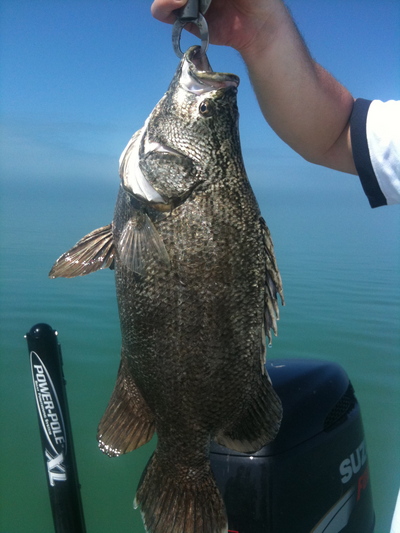Those of you just arriving to the Florida Keys may not be aware of some new fishing regulations that were issued in January of this year. Or maybe you live here but aren't sure of the changes. Here is a reminder of what those new regulations mean, paraphrased from the and Fish and Wildlife Conservation Commission (FWC) website:
The harvest of snook is prohibited until September 1, 2010, at the earliest. The harvest and possession of bonefish and tarpon is prohibited until April 1, 2010. However, "the FWC advises anglers that catch-and-release fishing for these important game fish species is still allowed."
Catch and release means leaving the fish in the water at all times. Respect the fishery, and enjoy the moment without your glory shot for a while.
Now, let's talk about a fish in the backcountry that you can harvest: Tripletail.
As the bite in the Gulf of Mexico heats up along with the water temperature, you'll probably notice alot of crab and lobster bouys in the area where you might be fishing for mackerel. When moving from spot to spot, I like to slow the boat down and find a line of trap bouys to run in anticiaption of spotting a tripletail near one of the floats. The tripletail, also known as a bouy fish, are attracted to the small crabs and shrimp that can collect in the sea grass and debris caught on the trap lines.
At first glance, the fish appears to be nothing more than grass or a floating plastic bag caught under the bouy. When you spot this, slow down and get a live shrimp ready to cast. When the fish is up cloe to the surface and the float, cast the shrimp on the up-current side of the float jig close to the surface, being careful not to let the hook get caught in the line. When the tripletail spots the shrimp, you'll see it chase down the shrimp thinking it's an easy meal. This is also a great sight fishing endeavor with the fly rod. You can cast a shrimp pattern or clouser minnow to these odd looking fish and watch as they chase it down as agressively as of it were a live shrimp.
Keep in mind that this fish is designated as a restricted species and there are certain limits enforced. As with all catches, it's important that you release most, if not all, of your fish caught that day. But if you want to keep one for dinner, here are a few of the rules you need to know.
With a valid saltwater license you may keep no more than two (2) tripletail from state waters per day that measure at least 15" overall. If you possess a valid saltwater products license with a restricted species endoresement, you can possess a limit of 10 tripletail per day per boat, not per commercial harvester on board.
As always, practice catch-and-release whenever possible and keep only what you might need for dinner.

